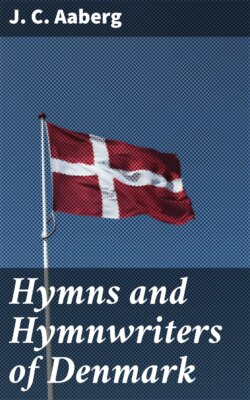Hymns and Hymnwriters of Denmark

Реклама. ООО «ЛитРес», ИНН: 7719571260.
Оглавление
J. C. Aaberg. Hymns and Hymnwriters of Denmark
Hymns and Hymnwriters of Denmark
Table of Contents
Foreword
INDEX
Chapter One Early Danish Hymnody
Chapter Two Reformation Hymnody
Thomas Kingo, the Easter Poet of Denmark
Chapter Three Kingo’s Childhood and Youth
Chapter Four Kingo, the Hymnwriter
Chapter Five Kingo’s Psalmbook
Chapter Six Kingo’s Church Hymns
Chapter Seven Kingo’s Later Years
Hans Adolph Brorson, the Christmas Singer of Denmark
Chapter Eight Brorson’s Childhood and Youth
Chapter Nine The Singer of Pietism
Chapter Ten Brorson’s SWAN-SONG
Nicolaj Frederik Severin Grundtvig. the Singer of Pentecost
Chapter Eleven Grundtvig’s Early Years
Chapter Twelve The Lonely Defender of the Bible
Chapter Thirteen The Living Word
Chapter Fourteen The Hymnwriter
Chapter Fifteen Grundtvig’s Hymns
Chapter Sixteen Grundtvig’s Later Years
Other Danish Hymnwriters
Chapter Seventeen
Отрывок из книги
J. C. Aaberg
Published by Good Press, 2019
.....
Hans Chrestensen Sthen, the first notable hymnwriter of the Danish church, was already on the scene, however, when Hans Thomisson’s Hymnal left the printers. He is thought to have been born at Roskilde about 1540; but neither the date nor the place of his birth is now known with certainty. He is reported to have been orphaned at an early age, and subsequently, to have been adopted and reared by the renowned Royal Chamberlain, Christopher Walkendorf. After receiving an excellent education, he became rector of a Latin school at Helsingør, the Elsinore of Shakespeare’s Hamlet, and later was appointed to a pastorate in the same city. In this latter office he was singularly successful. Lysander, one of his biographers, says of him that he was exceptionally well educated, known as a fine orator and noted as a successful author and translator. His hymns prove that he was also an earnest and warm-hearted Christian. The peoples of Helsingør loved him dearly, and for many years, after he had left their city, continued to “remember him with gifts of love for his long and faithful service among them”. In 1583, to the sorrow of his congregation he had accepted a call to Malmø, a city on the eastern shore of the Sound. But in this new field his earnest Evangelical preaching, provoked the resentment of a number of his most influential parishioners, who, motivated by a wish to blacken his name and secure his removal, instigated a suit against him for having mismanaged an inheritance left to his children by his first wife. The children themselves appeared in his defence, however, and expressed their complete satisfaction with his administration of their property; and the trumped up charge was wholly disproved. But his enemies still wanted to have him removed and, choosing a new method of attack, forwarded a petition to the king in which they claimed that “Master Hans Chrestensen Sthen because of weakness and old age was incompetent to discharge his duties as a pastor”, and asked for his removal to the parishes of Tygelse and Klagstrup. Though the king is reported to have granted the petition, other things seem to have intervened to prevent its execution, and the ill-used pastor appears to have remained at Malmø until his death, the date of which is unknown.
Sthen’s fame as a poet and hymnwriter rests mainly on two thin volumes of poetry. A Small Handbook, Containing Diverse Prayers and Songs Together with Some Rules for Life, Composed in Verse, which appeared in 1578, and A Small Wander Book, published in 1591. The books contain both a number of translations and some original poems. In some of the latter Sthen readopts the style of the old folk songs with their free metre, native imagery and characteristic refrain. His most successful compositions in this style are his fine morning and evening hymns, one of which is given below.
.....